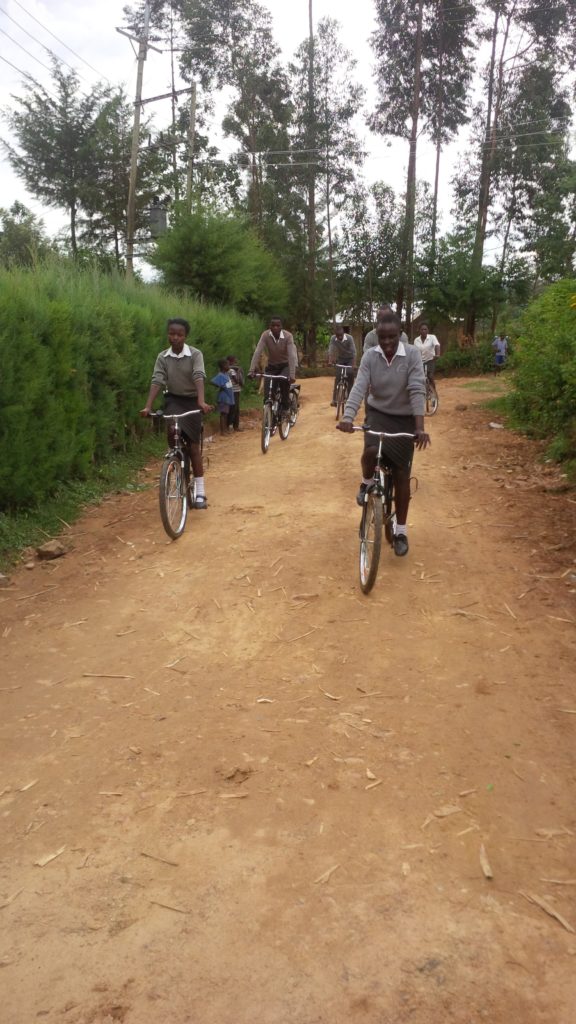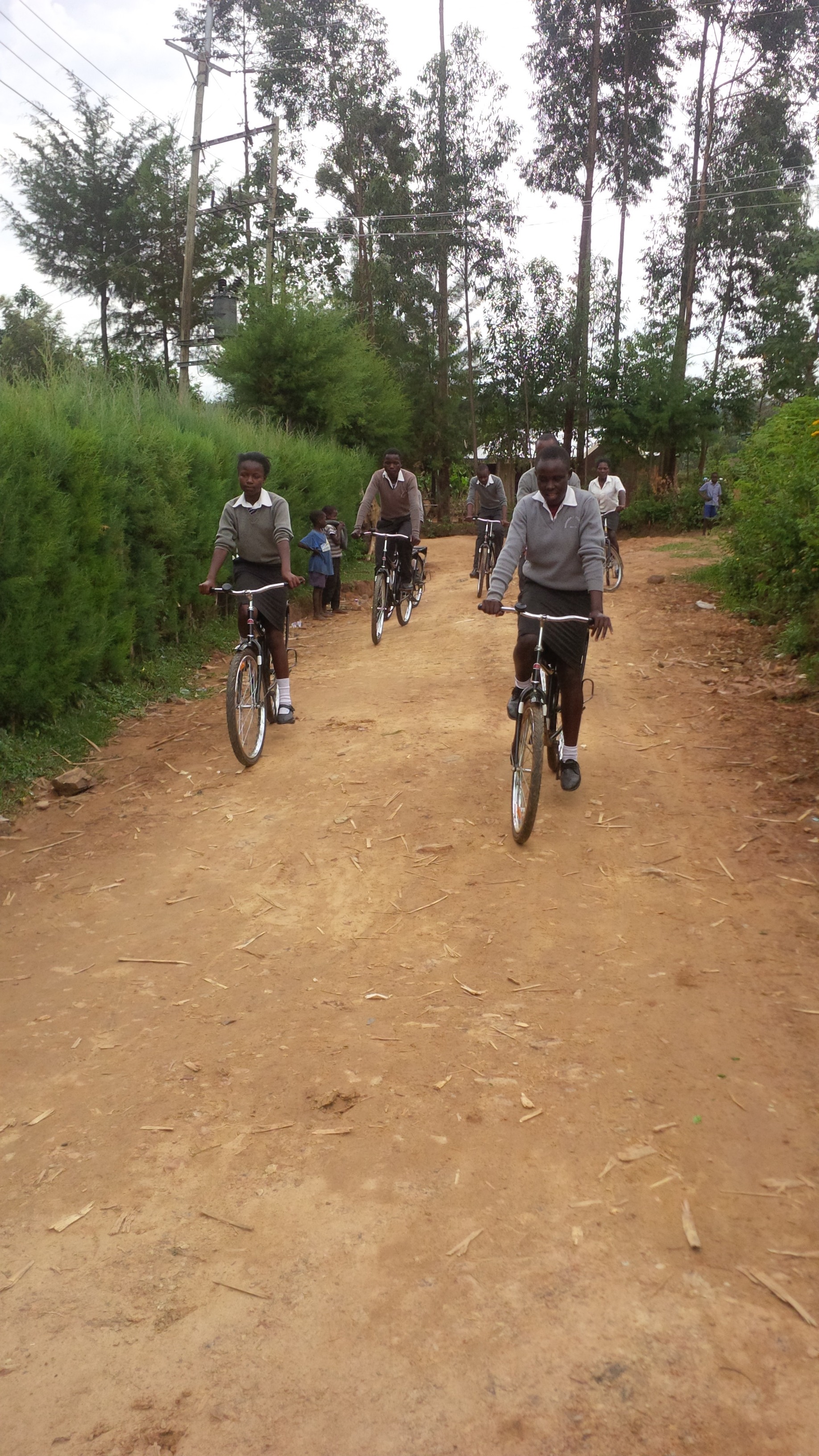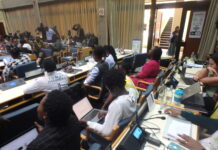By Albert Mwangeka
In the green and partly dusty narrow lanes of her village in Kakamega County, Soita Nelly, 17, negotiates the corners with skill as she as tries to cover the nine kilometre journey to her school, Mahanga Secondary School .
Despite the dust she can’t wait to get to school riding her new bicycle.
It is like the proverbial long journey to freedom that comes with a struggle.
 Nelly parks her bike and behind the passion is a hidden tale probably one that she does not love to tell more often.
Nelly parks her bike and behind the passion is a hidden tale probably one that she does not love to tell more often.
“I was impregnated by a boda boda operator. He used to give me free rides and the only price I was to pay was to give away sexual favours. After the pregnancy we parted ways .It was a sad and desperate time,” A Form three student sadly narrates.
This is not an isolated incident as the ‘2015 Adolescents and Youth Survey’ by the National Council of Population and Development NCPD noted that boda boda operators are increasingly becoming the main cause of early pregnancies.
“I loved education because I knew it would free me from the poverty chain. I come form a poor family. A family of nine children. I had to cover long distances to come to school. I also needed someone to ferry me to school every day so that I would not miss my classes, ” said another teenage girl from Mahanga Secondary who identified herself simply as Jacqueline.
“The motorcycle driver became my boyfriend. He is now the father to my baby,” She said.
Their headmaster Enoch Keya was saddened by the fact that boda boda drivers have become a nuisance to the girl child education in his school and the county as well.
“It is a big challenge as our students have to cover distances as far as 10 kilometres to come to school. As the girls walk, motor cycle drivers offer them free rides in exchange for sex,” Keya reiterates.
“Before it was shop keepers who were a nuisance as they could offer goods on credit for sex. However the boda boda menace is relatively new as the operators are young men. Some of the girls also feel that that it is fashionable to date such a person. These men also have good disposable income which helps them to charm the school going girls,” Explained Peter Arisi Deputy Director NCPD.
However Werunga Juma, a motorcycle operator says that his is a noble profession.
“We are well behaved people and we respect school going girls,” said Werunga.
Bicycle Relief
World Bicycle Relief and World Vision have come together to donate bicycles to students to prevent the rising cases of early pregnancies.
“When the girls are given bicycles they will not need free rides and they become less vulnerable,” said Judith Okungu from World Vision, Child Sponsorship Department.
Okungu said during the distribution of the bicycles priority was given to girls who walk long distances.
“Through a select committee which vets applications from students we have given away more than 900 bicycles to 7 schools in Kakamega county.70% of the bicycles went to the girls who walk long distances. The girls are able to reach school early and safelywith no disturbance,” she noted.
She added that cases of teenage pregnancy have reduced as girls become independent and do not need any form of favours to ferry them to school.
“They can now move in groups and protect one another when they ride their new bicycles. Cases of school drop out as a result of teenage pregnancy are now unheard of,” Explained Keya.
“I can now have enough time to take care of my infant as I reach home early in the evening, ” said an elated Jacqueline.
Early pregnancy statistics
The United Nations Population Fund UNFPA states that every day in developing countries 20,000 girls under the age 18 give birth. This amounts to 7.3 million births a year.
The Kenya Demographic Health Survey 2014 Teenage childbearing varies widely by county, from a low of 6% in Murang’a to a high of 40% in Narok. Young women with no education are much more likely to have begun childbearing (33%) compared to those with secondary or higher education (12%).
Prevalence is Kakamega stands at over 20%.
According to the survey one in five teenage girls is at risk of becoming pregnant.
“This has been the same situation since 2008. Further, this is a worrying trend as there have been cases of girls as young as 11 years getting pregnant. Parents and religious leaders need to take responsibility. Teenage boys need to be taught that girls are their peers and they need to be respected. Teenage pregnancies cause population increase and this brings pressure in resource distribution, “said Mwangi Kiunjuri the Cabinet Secretary for Devolution and Planning in Kenya.
Women empowerment
This year’s theme during the ‘World Population Day commemorated every 11th July was ‘Investing in Teenage Girls’.
“Sustainable Development Goals SDGs call for inclusiveness. We need to include adolescent girls as they are the most vulnerable due to early pregnancies that could occur as a result of early marriages. Most likely they discontinue their education after getting pregnant. There needs to be higher transition of girls from primary to secondary school as a way of protecting them,” said Cecelia Kimemia Population and Development Specialist UNFPA.
Dr. Babatunde Osotimehin Under-Secretary-General of the United Nations and Executive Director UNFPA said that adolescent girls should be allowed to reach their full potential by preventing teenage pregnancies and ensure that they stay in school.
“In some parts of the world a girl who reaches puberty is deemed by her family or community ready for marriage, pregnancy and childbirth. She may suffer a debilitating condition such as fistula from delivering a baby as her body is not ready for it. She may be denied her human rights,”Babatunde explained.
“Women need to be empowered in the society to break the poverty chain. Every human life is important no matter where they live. Women need to be empowered just like the SDGs require. Empowering them transforms families and the society as a whole, “explained Melinda Gates, co-chairperson of Bill and Melinda Gates Foundation, during her tour in Kenya.














